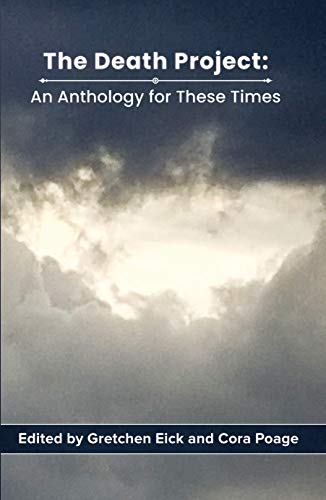“The Death Project: An Anthology for These Times,” edited by Gretchen Eick and Cora Poage (Blue Cedar Press, 2021, 196 pages)
By Ted Ayres
I have for some time admired historian and activist Gretchen Eick, rating her 2001 book, “Dissent in Wichita,” a classic. Eick worked on Capitol Hill in Washington, D.C. for more than a decade as a foreign and military policy lobbyist before earning a Ph.D. in American Studies from the University of Kansas and becoming a professor of history at Friends University. She currently lives half the year in Bosnia and Herzegovina, teaching English at Dzemal Bijedic University, and half the year in Wichita where she teaches and writes books.
It is an understatement to note that 2020 was a challenging year. Eick and her daughter — life coach and spiritual counselor Cora Poage — decided to attempt to help people cope in this extraordinary time. So early in 2020, Blue Cedar Press sent out invitations asking people to submit pieces they had written about death. Ultimately, 36 people from the United Kingdom, Turkey, Bosnia and Herzegovina, Australia and the United States submitted their stories, poems and memories. Grief, war, suicide, racism and, of course, COVID-19 loom large.
In a chapter entitled “Black Lives Matter,” former Kansas state Sen. Donald Betts, Jr. writes about growing up with his younger brother, Ron, and the different paths they traveled. “When educational services, mentorship programs, job training and employment are lacking, it opens the door to poverty, depression, violence, drugs, gangs, death and racial profiling,” Betts writes, noting that “even state senators are racially profiled.”
In a chapter entitled “The Process of Dying,” former Wichita Eagle columnist Mark McCormick tells the amazing story of Cassie Boone, who stopped her car on I-235 on a Saturday night when she saw a motorcycle pileup on the side of the road and a young man lying on his stomach on a patch of sloping grass. Her efforts to comfort Abram Wesley “Wes” Christopher and respond to his dying wish — “Tell Mom I love her” — is an important story about the kindness of strangers in difficult circumstances.
In a chapter entitled Rituals and Religion, I found a beautiful poem by retired teacher Judy Keller Hatteberg about the funeral of a veteran where, “The only sounds and motions are the swaying prairie grasses and the fluttering cottonwood leaves.”
I was immediately intrigued when I saw the title of this book. In spite of its starkly grim title, I found it to be surprisingly uplifting, hopeful and a helpful guide to a topic that we all must ultimately address in one fashion or another. In this regard, I was touched by a story Cora Poage penned about her grandfather and his struggle with Alzheimer’s. She writes, “A few days before my grandfather passed away, he looked at my grandmother and said, ‘I don’t know who you are, but I sure do Love you.’”
Contact Ted Ayres at
ted.ayres@shockers.wichita.edu.









